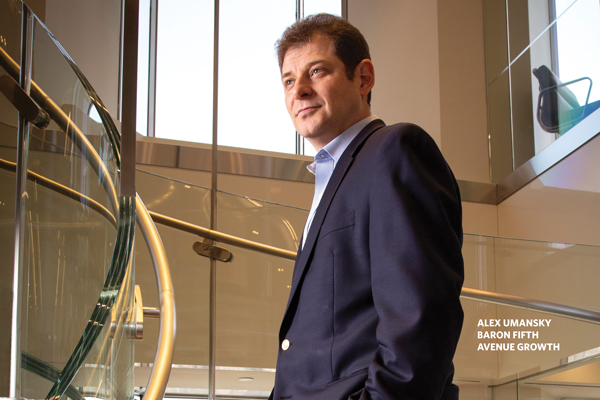For over seven years, the Baron Fifth Avenue Growth fund was a fairly typical large-company growth vehicle with a diversified portfolio of over 100 stocks, lots of benchmark index companies, and so-so performance.
That changed pretty quickly when Alex Umansky, who had been a large-cap growth manager at Morgan Stanley for many years, assumed control in November 2011. Within a relatively short time he had whittled the fund down to fewer than 40 carefully chosen stocks and gave the best ideas ample room to run.
One such stock was Amazon, which accounted for less than 1% of portfolio assets when he took over. Now that number is up to 16%. And that bias toward concentrated holdings is evident throughout the portfolio. At the end of the first quarter, the fund’s top three holdings, Amazon, Alibaba and Alphabet, accounted for 29% of net assets, and the top 10 names represented nearly 60% of the fund. The portfolio owns 32 stocks, while the typical large-cap growth fund owns 125.
“The fund’s old portfolio was structured to guard against volatility,” says the 46-year-old Umansky. “I guard against over-diversification. If you have a portfolio of 100 names, you’re really just providing exposure to an asset class. We’re in the business of finding mispriced securities and adding alpha.”
In a world where active management is constantly measured against index performance, the stance is a bold one, and so far it has paid off. From the beginning of Umansky’s tenure through the end of March, the fund returned 182.6% cumulatively while the Russell 1000 Growth index returned 159.9%. The annualized return for the fund was 18.1% while it was 16.5% for the index. Last year, the fund’s 40.64% return trounced the index’s 30.32%.
Umansky acknowledges that part of the fund’s success since last year comes from a bounce-back following a disappointing 2016, when newly elected President Donald Trump had promised to boost more value-oriented infrastructure plays and energy and growth stocks as a result fell out of favor. When investors realized that corporate tax cuts and profit repatriation would benefit a broader swath of companies, beaten down growth stocks came roaring back the following year and have continued to reach higher ground this year.
Stock picking has also contributed to strong performance. Besides Amazon, the fund has a hefty stake in other names that have done well such as Alibaba, China’s largest e-commerce company; Intuitive Surgical, a medical device manufacturer; and genetic sequencing company Illumina.
The fund’s turnover rate is 14%, significantly lower than the 58% average in Morningstar’s large-growth category, and that points to management’s willingness to hang in with a company name for the long term—as long as the original investing thesis for it remains sound and its valuation doesn’t get too steep. Unlike many managers, Umansky usually doesn’t “trade around” existing positions by constantly buying more shares when prices are down and selling when they’re higher.
At times he may raise cash from the sale of an existing position and use it to buy something more interesting, which happened more than usual in the first quarter of 2018. Although the fund usually buys only a few stocks each year, the market volatility during that period gave Umansky the opportunity to establish several new positions at favorable prices.
The Art Of High Conviction Investing
July 2, 2018
« Previous Article
| Next Article »
Login in order to post a comment








